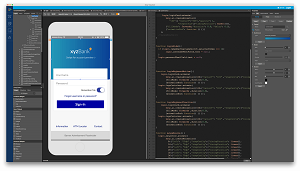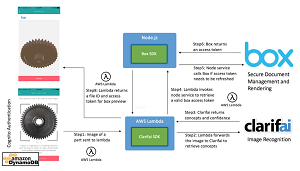Amazon Cloud Courts Mobile Developers at re:Invent 2016
If you’re overwhelmed by the vast amount of application development news emanating from this week’s re:Invent conference by Amazon Web Services Inc. (AWS), here’s a roundup of the items especially relevant to mobile coders.
AWS Mobile Hub
The company announced enhancements to AWS Mobile Hub, which — among other things — provides back-end functionality for mobile apps, such as user authentication, data storage, back-end logic, push notifications, content delivery and analytics.
The tool received new user management capabilities and Software-as-a-Service (SaaS) integration. Because back-end services are so important to mobile devs in so many ways, we covered it in more detail here.
Amazon Lex Integration
The aforementioned article doesn’t cover another Hub-related, the integration with Amazon Lex. That product lets developers build conversational interfaces into their apps (think chatbots). By tying in to the Lex service, Mobile Hub developers can more easily leverage this cutting-edge technology.
 [Click on image for larger view.] Amazon Lex (source: AWS)
[Click on image for larger view.] Amazon Lex (source: AWS)
“This lets you use the technology that powers Amazon Alexa to create engaging speech- and text-based conversational bots in your own app,” AWS said in a blog post. “Each bot you create with Mobile Hub uses Amazon Lex to recognize the intent of natural language input and triggers appropriate business functions.”
Amazon Pinpoint
This is a new mobile app analytics service that leverages push notifications to drive user engagement. “Amazon Pinpoint helps you understand user behavior, define which users to target, determine which messages to send, schedule the best time to deliver the messages, and then track the results of your campaign,” the company said in a blog post.
The tool can be used in conjunction with the Mobile Hub. Pinpoint is included in the AWS Mobile SDK , used for both iOS and Android development, or it can be accessed directly via the Amazon Pinpoint REST API .
For analytics, it features a console that can be used to view graphical analytics reports or export the gathered data to Amazon’s storage service, S3, for more involved analytics.
 [Click on image for larger view.] Amazon Pinpoint (source: AWS)
[Click on image for larger view.] Amazon Pinpoint (source: AWS)
Once developers have gleaned business insights from the analyzed data, they can set up push notifications as part of a campaign to improve service to users and keep them aware of and engaged with their apps.
“Targeted push notifications based on app usage trends and user behavior have become a popular approach for mobile app user engagement because response rates are often several times higher than tradition email marketing campaigns,” AWS said. “By using targeted push notifications, you can increase message relevance and effectiveness, measure engagement and continually improve your campaigns.”
The tool helps developers create audience segments to customize the push notification campaigns, and the notifications can be scheduled for one-time or recurring campaigns.
After that, the tool provides app metrics to help developers determine how successful their push notification campaigns were, such as the number of app sessions prompted by a campaign and any increased revenue generation. “You can also export the resulting event data and run custom analytics using your existing analytics tools,” the company said. “Pinpoint can also help you A/B test different messages, track results, and then send the best message to your target segment.”
Pricing details can be found here.
Kony Visualizer Integration
While not coming from AWS itself, mobile dev firm Kony Inc. used the re:Invent conference to announce its Kony Visualizer tool has been integrated with the AWS platform.
According to a Kony statement, this helps developers “further simplify building mobile apps on the AWS cloud by providing pre-integrated support for the AWS Mobile SDK, along with built-in support for mobile services like Amazon Cognito, AWS Lambda, and Amazon DynamoDB.”
 [Click on image for larger view.] Kony Visualizer (source: Kony)
[Click on image for larger view.] Kony Visualizer (source: Kony)
Kony said the AWS integration helps coders create native, hybrid and Web apps from a shared code base using JavaScript, as part of its recently announced omni-channel offering based on a JavaScript API approach.
“With this new version of Kony Visualizer, Kony provides customers with a simpler and faster way to quickly access the scalable and secure environment of AWS, helping them reduce the complexity of mobile development,” said AWS exec Amit Patel. “By providing pre-integrated access to AWS mobile services APIs, Kony has extended its visual development environment with more benefits for AWS customers.”
At the conference, Kony participated in a session in which it highlighted Box as one of the early customers of the new Kony Visualizer for AWS offering. Box provides a “content platform-as-a-service (PaaS) that enables businesses to bring secure content management and collaboration capabilities to customized Web and mobile apps — without having to build or maintain a separate content layer.”
 [Click on image for larger view.] The Box/Kony/AWS Project (source: Box)
[Click on image for larger view.] The Box/Kony/AWS Project (source: Box)
“Leveraging Amazon Web Services including Cognito, DynamoDB and Lambda, Kony’s rapid mobile application development tools, Box Platform’s APIs, and Clarifai’s image recognition API, we were able to quickly build and deploy an enterprise-ready field worker enablement application,” Box said in its own blog post.
Kony Visualizer for Amazon Web Services can be purchased in the AWS Marketplace.